|
|
|
Sort Order |
|
|
|
Items / Page
|
|
|
|
|
|
|
| Srl | Item |
| 1 |
ID:
129579


|
|
|
|
|
| Publication |
2014.
|
| Summary/Abstract |
This article questions the effectiveness of EU efforts to prevent terrorism and violent radicalization as well as the future prospects of such efforts. Driven by the pressure of attacks, member states have agreed on a comprehensive strategy to prevent radicalization and recruitment into terrorism, but simultaneously the strategy traces the limits of EU authority in member states in this regard. Meanwhile, the European Commission has focused on indirect measures, such as research support, for counter radicalization. However, over time, both flexible cooperation among a subset of member states and new EU initiatives have generated only few or biased policy outputs. The Stockholm Programme renewed the ambition to prevent terrorism at an early stage and underlined the EU's role in evaluation and knowledge exchange. This article questions the resulting proposal to create a network of local or subnational actors for best practice exchange. The article argues that preventive counterterrorism relies on contentious scientific evidence and that authoritative evaluations remain tied to national policy-making. Finally, the EU Commission cannot mobilize sufficient resources to ensure that 'frontline' organizations, such as police services, implement new practices. Taken together, this limits the potential for depoliticizing multilevel governance approaches to terrorism prevention. The conclusions of this article raise further research questions on the use of knowledge and complex governance patterns in EU internal security.
|
|
|
|
|
|
|
|
|
|
|
|
|
|
|
|
| 2 |
ID:
129583


|
|
|
|
|
| Publication |
2014.
|
| Summary/Abstract |
External action has been of growing importance for the Union's Area of Freedom, Security and Justice (AFSJ) and accounted in 2011 already for over 19 per cent of all texts adopted by the Justice and Home Affairs Council. AFSJ related external action has also added a new dimension to previously existing fields of EU external relations. This article first considers the internal and external factors which have influenced the development the external side of the AFSJ and the impact of the post-Lisbon legal and institutional framework, including the special context created by the 'opt-outs' and coherence problems within this framework. It then provides a survey and analysis of the main forms of EU action in this domain (strategy formulation, cooperation with third countries, capacity-building and cooperation with and within international organizations) before assessing-in the conclusions-the implications of this external dimension for both the EU and the Member States and its future developments prospects.
|
|
|
|
|
|
|
|
|
|
|
|
|
|
|
|
| 3 |
ID:
129584
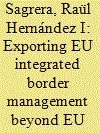

|
|
|
|
|
| Publication |
2014.
|
| Summary/Abstract |
The external dimension of European Union (EU) border management cooperation has recently been developed, in particular through the promotion of integrated border management (IBM). The European Commission has been keen to foster IBM, an attempt to reach EU standards in the absence of an EU common border service. Integrated border management is regulated under the Treaty of Lisbon, and the Stockholm Programme calls for its further development. This article analyses and compares the policy instruments promoting IBM standards beyond EU borders, namely the European Agency for Operational Cooperation at the External Border of the Member States of the EU (FRONTEX) (with the signature of Working Arrangements with the border services of third countries) and the activity of the EU Border Assistance Mission to the Republic of Moldova and to Ukraine (EUBAM) at the Ukrainian-Moldovan border. Moreover, it provides an empirical account of IBM activity carried out in the Eastern Partnership and Russia, and explains the reasons underlying the lack of IBM promotion in the southern Mediterranean countries.
|
|
|
|
|
|
|
|
|
|
|
|
|
|
|
|
| 4 |
ID:
129577
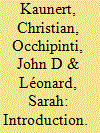

|
|
|
|
|
| Publication |
2014.
|
| Summary/Abstract |
Following several months of uncertainty in the wake of the rejection of the treaty establishing a constitution for Europe, the Lisbon Treaty eventually entered into force in December 2009. Although it fell short of establishing a constitution for the European Union (EU), it introduced several noteworthy changes, notably for EU internal security policies, also known as the 'Area of Freedom, Security and Justice' (AFSJ). This special section considers how various dimensions of the AFSJ have been affected by the Lisbon Treaty and the gradual reinforcement of supranational governance that it has generated in this key policy area. Over the past decade, the AFSJ has experienced tremendous development, making it one of the most dynamics areas of European integration. The AFSJ is a broad and heterogeneous policy domain, which includes asylum, immigration and border policies, counter-terrorism, justice and police cooperation, as well as the external dimension of these activities. Given the crucial importance of current internal security threats, such as terrorism, and the sensitivities surrounding policy responses to them, it is necessary to take stock of how far the EU has progressed toward its goals of an AFSJ and how this has been influenced by the most recent treaty changes. To accomplish this goal, this special section brings together some of the most distinguished scholars in the field and several younger scholars conducting cutting-edge research on the AFSJ.
|
|
|
|
|
|
|
|
|
|
|
|
|
|
|
|
| 5 |
ID:
129575
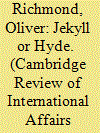

|
|
|
|
|
| Publication |
2014.
|
| Summary/Abstract |
As a response to the dynamics of state formation, statebuilding has not created model states in the last twenty years as was intended. Instead, the states that have emerged around the world are heavily contextually contingent. This is despite international attempts to shape them according to a common pattern, dominated by neoliberal models of statehood. This raises the question of what kind of hybrid states are actually forming as a result of the encounter between international statebuilding and local political dynamics? This article argues that international statebuilding aims to create neoliberal states and treats local political dynamics as dysfunctional. Yet from a local perspective the limitations of the statebuilding model are also apparent, as is the need for any locally legitimate state to be grounded in its context.
|
|
|
|
|
|
|
|
|
|
|
|
|
|
|
|
| 6 |
ID:
129578


|
|
|
|
|
| Publication |
2014.
|
| Summary/Abstract |
This article analyses the evolution of European Union (EU) police cooperation on the basis of structural processes in the form of agencification, regulation and standardization, as well as substantive processes in the form of information-sharing and multi-disciplinary cooperation. The Lisbon Treaty holds some key conditions for further integration. The level of integration of police cooperation in the EU is measured by analysing institutional power, the regulatory framework and transnational professionalism. Despite a positive score on each of these levels, member states remain caught between national sovereignty and solidarity. As a consequence, they face an implementation gap and have not embedded European police cooperation in their domestic systems. Building on the pro-integrative moves that have been introduced by virtue of the Lisbon Treaty, improved governance and deeper integration can be achieved by means of more active parliamentary involvement, independent police oversight (both at European and at the national level), the mainstreaming of cooperation mechanisms and a systematic Europe-wide cultivation of police professionalism. Within the realm of internal security cooperation in the EU, a concerted effort is required which demands close consultation between relevant institutional actors and the professional actors in the member states.
|
|
|
|
|
|
|
|
|
|
|
|
|
|
|
|
| 7 |
ID:
129576
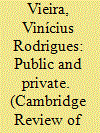

|
|
|
|
|
| Publication |
2014.
|
| Summary/Abstract |
The current literature on comparative political economy does not seem to consider unifying under a single theoretical framework the analysis of continuity and change in different economic systems. On the one hand, major comparative works derive their theoretical propositions from dynamics in the Western world. On the other, studies that are focused on national trajectories of development are concentrated in cross-national comparisons involving countries with similar characteristics in what concerns strategies of development. In this paper, I argue that all fields in the world of social action are pervaded by two major fields, hereby dubbed 'meta-fields': public and private. Both are in a 'double movement' to shape each other's boundaries through the definition of social and property rights that regulate access to human capabilities and capital. Public and private are meta-fields because they constrain human action and the organization of social configurations on state and non-state levels.
|
|
|
|
|
|
|
|
|
|
|
|
|
|
|
|
| 8 |
ID:
129581
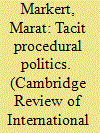

|
|
|
|
|
| Publication |
2014.
|
| Summary/Abstract |
This article analyses the dynamics of procedural politics in the EU's Police and Judicial Cooperation in Criminal Matters across subsequent Treaty regimes (Amsterdam and Lisbon). In the course of legislative policy-making in this area, member states and the European Commission engage in strategic interactions with respect to procedural rules, whereby specifically member states attempt to contain integrationist legislation coming from the Commission through legislative preemption strategies. Drawing on Joseph Jupille's procedural politics approach, the article hypothesizes that member states' strategies are conditioned by several scope conditions, notably jurisdictional ambiguity, influence difference between different decision-making procedures, and prointegrationist case law from the European Court of Justice. I test these hypotheses by analysing the legislative process on a number of selected cases.
|
|
|
|
|
|
|
|
|
|
|
|
|
|
|
|
| 9 |
ID:
129582
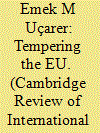

|
|
|
|
|
| Publication |
2014.
|
| Summary/Abstract |
The European Union's (EU) area of Freedom, Security and Justice (AFSJ) portfolio comprises policy areas such as immigration and asylum, and police and judicial cooperation. Steps were taken to bring this field into the mandate of the EU first by the Maastricht Treaty, followed by changes implemented by the Amsterdam and Lisbon Treaties, the last one 'normalizing' the EU's erstwhile Third Pillar. As the emergent EU regime continues to consolidate in this field, NGOs of various kinds continue to seek to influence policy-making and implementation, with varying success. This article seeks to establish the context in which NGOs carry out their work and argues that the EU-NGO interface is impacted both by the institutional realities of the European Union and the capacities of EU-oriented NGOs to seize and expand opportunities for access and input into the policy cycle. Using EU instruments representing three different policy bundles in AFSJ (immigration, asylum and judicial cooperation in criminal matters), the article seeks to map out NGO strategies in engaging and oftentimes resisting European Union policy instruments.
|
|
|
|
|
|
|
|
|
|
|
|
|
|
|
|
| 10 |
ID:
129580
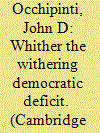

|
|
|
|
|
| Publication |
2014.
|
| Summary/Abstract |
This article examines how the Lisbon Treaty's changes to the European Union's (EU's) Area of Freedom, Security and Justice (AFSJ) have affected its 'democratic deficit'. How this issue is perceived depends on one's conceptual understanding of democratic legitimacy. This article reviews key scholarly perspectives on this matter and organizes these according to Schmidt's concepts of 'inputs', 'throughputs' and 'outputs'. The article then applies this framework to specific innovations of the Lisbon Treaty, including new roles for the European Parliament and Court of Justice in the AFSJ. The article concludes that the EU's latest treaty has improved its democratic deficit in some regards, but that many issues of democratic legitimacy remain.
|
|
|
|
|
|
|
|
|
|
|
|
|
|
|
|
|
|
|
|
|